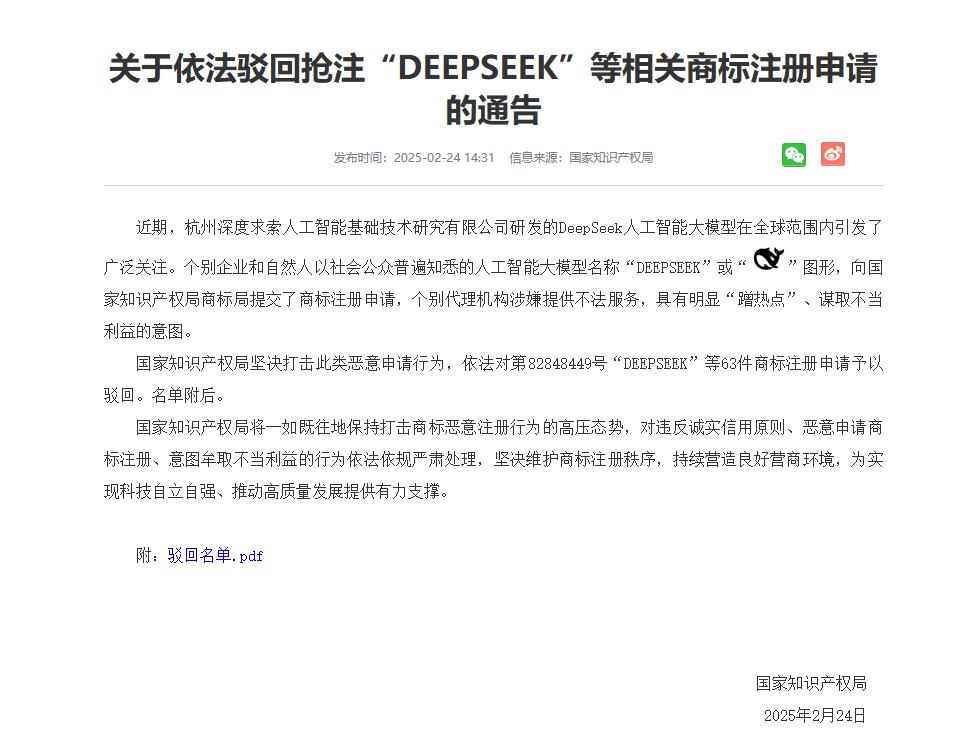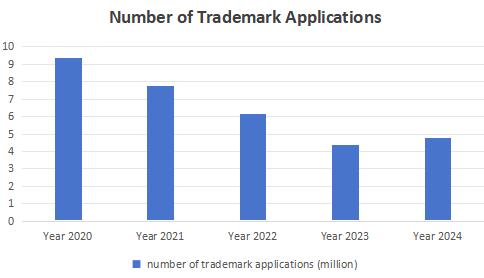On February 24, 2025, the China National Intellectual Property Administration (CNIPA) issued a notice announcing the rejection of 63 malicious trademark applications for "DEEPSEEK" and its associated graphic. The notice states that certain applicants submitted these trademark applications due to DeepSeek's widespread recognition among the public. Consequently, the CNIPA proactively rejected these applications ex officio.

In one of our articles we published last month, we reported that DeepSeek had only secured trademark protection in China, while its presence in other countries remained limited. However, malicious trademark applications had already surfaced in Australia, New Zealand, Canada, Turkey, the UK, and Germany. Notably, Mexico and Brazil have now been added to this growing list. Over the past few months, similar trademark applications, including variations such as "DeepSee", "DeepSec", "DepSeek", and "DeepDeek", have also emerged.
One particularly concerning application was filed by a company in Suzhou, China, which could have posed a potential risk by claiming priority in other jurisdictions. Fortunately, this application has now been rejected by the CNIPA. As a result, DeepSeek’s European Union trademark application, filed on January 17, is now more likely to succeed.
Since the CNIPA intensified its efforts against malicious trademark registrations, the total number of trademark applications in China has declined significantly from 2020 to 2023. Although the number of trademark applications slightly increased in 2024, the overall application volume remains significantly different from that before 2020.

The ex officio rejection of bad-faith trademark applications is not unprecedented in the Deepseek case. Prior to this case, the CNIPA had also fully exercised its administrative authority to combat bad-faith trademark registrations. Here are several cases as examples:
1. "Huoshenshan" and "Leishenshan" Trademarks
During the COVID-19 pandemic, some entities attempted to register trademarks for "Huoshenshan" and "Leishenshan", the names of emergency hospitals in Wuhan. The CNIPA rejected these applications, citing violations of public interest under the Trademark Law.
2. "Pure Love" Trademark
The phrase "Pure Love", associated with a martyred soldier, was attempted to be registered for commercial use. The CNIPA rejected these applications on the grounds that such registrations violated social morality and public interest.
3. "ChatGPT" trademarks
In 2023, OpenAI's ChatGPT gained worldwide recognition, becoming a major topic in the AI industry. Several entities in China sought to register "ChatGPT" and related terms across multiple categories. The CNIPA rejected these applications under Article 4 (bad-faith registration) and Article 10 (public interest) of the Trademark Law. This case underscores the CNIPA’s commitment to combating the unauthorized registration of internationally renowned brands and ensuring fair market competition.
The CNIPA remains steadfast in its efforts to combat malicious trademark registrations. This firm stance is crucial for maintaining the integrity of the trademark system, fostering a fair and competitive business environment, and supporting technological self-reliance and high-quality economic development in China.

